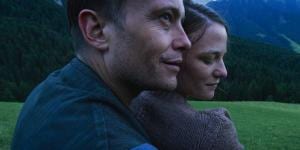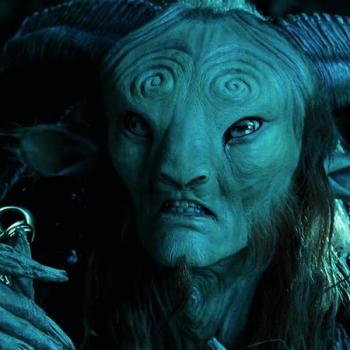
The films of director Terrence Malick are certainly not everyone’s cup of tea. They’re long, sprawling, meditative experiences that largely eschew plot in favor of impressionistic imagery, aiming to evoke a sense of transcendence through sweeping visuals of nature and the intimate dimensions of human life. From The Tree of Life to Knight of Cups, Malick’s movies leave open few entry points for the audience: one either fully commits to Malick’s inimitable vision or finds his work totally opaque.
The astonishing new Malick film A Hidden Life is perhaps his most accessible work, trading mystical crosscutting between time periods for a more linear narrative. This time around, Malick tackles the true story of the Blessed Franz Jägerstätter—an Austrian farmer martyred during World War II for his refusal to swear loyalty to Hitler. But while Malick’s more indulgent storytelling tendencies may be restrained here, the sheer force of his cinematic ethos is most certainly not: A Hidden Life is one of the most powerful and profoundly Christian films I’ve ever seen in theaters.
The story itself is straightforward, even spare. As the narrative opens, Franz and his family are living—where they have for generations—in a serene, picturesque mountain village, largely removed from world affairs. But when Hitler begins his rise to power, Franz quickly realizes he cannot bow to the false faith of the Nazis. His choice, beginning with his refusal to donate money to the war effort, has immediate consequences: the Jägerstätters’ neighbors start to spurn them, reading Franz’s reticence to join the Nazis as a moral betrayal of the sacred fatherland. And once Franz is eventually called up to serve in the German army—and refuses—the stakes become higher still. For the punishment for Franz’s “treason,” under Nazi law, is imprisonment and death.
Crucially, Malick never frames Franz’s choice as a facile refusal to do obviously terrible things. We never see images of concentration camps or Nuremberg rallies—the sort of thing we tell ourselves would convince us to resist. The evil forces in A Hidden Life manifest slowly, seductively, creeping into Franz’s village in the guise of neighborly opinion and popular sentiment. Evil, here, is banal. And yet Franz immediately recognizes it for what its: a rival creed in which Caesar supplants Jesus, and that will brook no contrary loyalties.
We are left with no doubt that Franz’s stand isn’t grounded in an objection to war qua war. Rather, his is a refusal to profess allegiance to a moral lie, and as a result his story plays out as a kind of participation in the suffering and death of the similarly innocent Christ. Early on, an old man tells Franz that Jesus has plenty of admirers, but few followers. Not many will, in extremis, pick up their crosses and follow Him—but Franz does just that, at staggering cost.
Where A Hidden Life becomes truly wrenching is in its portrayal of Franz’s joyous, ever-wholesome family life—in particular, his deep bond with his wife Fani and their three daughters. Not for a moment are we left to think that Franz is the only one suffering when the Nazis close in: abandoned by her scornful community and struggling to cope with her husband’s absence, Fani labors alone on their mountain farm, plowing fields and digging wells all by herself.
But—and this is critical—A Hidden Life is decidedly not a tragedy.
A profound and abiding sense of hope suffuses the entire film, even in its darkest and bleakest moments. For Franz, all that matters is faithfulness to—and love of—the transcendent God who, in the end, will make all things new. That is the promise in which he trusts and to which he clings, and it is powerful enough to sustain him through beatings, unjust interrogations and trials, and ultimately a violent death.
Thorns—and temptations—litter his path at every turn. Fellow prisoners taunt him for his faith and jeer that God has forgotten him. Nazi bureaucrats scoff that his sacrifice is meaningless and will be forever forgotten. The local priest and bishop insist that he must acknowledge his duty to Germany. Franz’s court-appointed lawyer constantly dangles the prospect of freedom before him, inviting him to simply sign the loyalty oath and immediately walk free. On and on it goes, and yet Franz never wavers. His hope is not a matter of human liberty, but of eternal rest and redemption.
In depicting this kind of hope, A Hidden Life positions itself as a searing rebuttal to Martin Scorsese’s grim epic Silence. Both films follow a similar plot structure and explore parallel themes: innocent men find themselves faced with violent persecution, which is accompanied by seductive philosophical arguments about the need to abandon previously held convictions. So too, at the films’ climactic moments, the protagonists find themselves confronted with extreme instances of suffering and are offered a choice: renounce the faith and live, or reaffirm it and die. Silence portrays the first: Father Rodrigues tramples the fumi-e, believing the voice of Christ has urged him to do so, and spends the rest of his life quietly reckoning with that decision, secretly tormented by his instant of weakness yet too afraid to confess it. A Hidden Life depicts the latter path: Franz holds the line and goes boldly—freely—to his death. And in that moment, he is victorious.
Last month, I read through Jonathan Lear’s exceptional book Radical Hope: Ethics in the Face of Cultural Devastation, which chronicles the suffering and survival of the Crow tribe of Native Americans through the rapid cultural transformations of the late 1800s. Lear’s book poses a powerful question to its readers: what do you hold onto in the moment when everything around you—everything that has anchored the logic of your social order—falls apart? What is the answer to nihilism in that scenario?
Drawing on the life of Crow leader Plenty Coups, Lear explains that “radical hope” is required to withstand the storm—faith in an essential promise that goodness and flourishing, sometime in the future, will once again be manifest. For Plenty Coups, that promise took the form of words spoken to him during a spiritual experience, assuring him that the Crow would endure. And for Franz Jägerstätter—boldly soldiering toward his sacrificial death without any knowledge of how history would unfold, or whether his act would be remembered—that promise took the form of the Christian kerygma: the Kingdom of God is at hand.
Christian hope, after all, is always radical hope. It is not a promise of earthly flourishing or historical vindication, as Franz understood. Rather, it is the hope expressed in the closing words of the Apostles’ Creed: the resurrection of the body, and the life everlasting. No other hope can suitably ground the logic of Franz’s sacrifice, and no other hope can compare to it. A Hidden Life understands and depicts this more richly than perhaps any other film I’ve seen.
I wrote recently about the inability of much of modern culture to understand the absolute centrality of faith commitments in the lives of believers. It’s far easier, no doubt, to treat sincere conviction as a social nicety or tribal signifier, or perhaps simply an excuse for some sort of bigotry. That is the preconception A Hidden Life so dramatically upends, by forcing the audience to behold a “radical hope” that so many today simply cannot understand. Franz’s stand benefits him nothing in material terms, and costs him everything—and yet we, the audience, know that his actions are heroic in a more-than-crudely-existentialist way. His sacrifice is a sacrifice in the name of the transcendent Good, buttressed by a similarly transcendent hope. And I struggle to think of anything that’s more edifying for a movie to depict.
To be sure, Malick never hesitates to show the sad and painful aspects—for both Franz and Fani—of Franz’s fateful choice. But this is a good and proper sadness: where Silence plunges the viewer into a thick morass of moral confusion, A Hidden Life is a cleansing, purgative flame. Would you,Malick dares to ask us, have the strength to follow Jesus rather than merely admiring Him? The film has the audacity to suggest that the right choice, in many situations, is not especially unclear: what is lacking on our parts is moral courage, a willingness to trust in radical hope, and out of that deficiency flow all our rationalizations and excuses for not doing the good. The answer, we know in our bones, is never to trample the fumi-e.
With 2020 nominations already out, it appears that Oscar voters—to their shame—have largely ignored A Hidden Life. No matter. This is a rare and beautiful movie that’s well worth trekking out of your way to see, extended runtime notwithstanding. Anyone who’s ever wondered why Hollywood doesn’t make good movies about people of faith, or otherwise bemoaned the lack of exceptional Christian art in the new millennium, need look no further. A Hidden Life is what you’ve been longing for.












